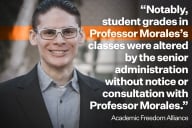You have /5 articles left.
Sign up for a free account or log in.
The National Association of College and University Business Officers is publishing a report today specifically designed for the handful of you who haven't read absolutely every word Inside Higher Ed has published on the work of the Secretary of Education's Commission on the Future of Higher Education.
Okay, so maybe there are more than a few of you. (It’s not too late: you can find the highlights of our coverage here.) The report, “Assessing the Impact of the Spellings Commission: The Message, the Messenger, and the Dynamics of Change in Higher Education,” exhaustively reviews the commission’s genesis, deliberations and recommendations in 2005-6; the Education Department’s efforts to carry out the panel’s work over the last two years; and the responses of those within higher education to all of the above.
The report, which was conducted by a group of communication and organizational development scholars at Rutgers, Penn State and Fordham Universities, is first and foremost an academic work, emphasizing broad collection of information and surveying of views (from more than 30 observers of the process, including this reporter) over offering the scholars’ own interpretations, analyses and opinions.
It dispassionately presents and balances the often conflicting viewpoints of participants in the commission’s work and aftermath -- Education Department officials who pushed the panel’s agenda, higher education association officials who frequently fought it, and others from within academe who bemoaned the often defensive response from college leaders -- and lets their words do most of the talking.
But the report’s authors ultimately do, in a subtle way, synthesize the strands and impressions to offer a mixed assessment of the commission's -- and by extension the Bush administration's -- effort to change the conversation about, and less successfully, alter the conduct of American higher education.
On balance the report's portrait credits the Spellings panel and its sponsors within the Education Department for correctly diagnosing and drawing heightened attention to a set of significant problems that plague higher education and the country, but questions the wisdom of the combative rather than collegial approach that the commission took in laying out its recommendations and the Education Department embraced in implementing them, especially in its aggressive push to alter accreditation.
"[T]he impact of the Commission and the effectiveness of the initiative overall can be seen most clearly in: 1) the attention it afforded to the issues and themes addressed in the Report and follow-up activities; 2) the dialogue that has been stimulated by these efforts; and 3) the numerous voluntary improvement
projects and programs that have been energized and inspired during this period," the authors write. "However, the effort has had considerably less impact and success in fostering the kind of mutual respect, constructive collaboration, and engaged partnering that seems necessary to unite the higher education community, Congress, and the Department in the joint pursuit of a common agenda."
Similarly, the report's authors recognize college leaders both with having made more progress in recent years in addressing the perceived problems than the commission gave them credit for, and with responding in several key ways to the challenge put to them by the commission's report, with several college associations undertaking new accountability systems and dozens of colleges expanding their financial support for low-income students.
But higher education's representatives in Washington, especially, come in for criticism for spending far too much time responding to perceived slights and playing defense than to constructively acknowledging the need for change.
"Much of the higher education community has taken considerable pleasure in its success at resisting externally mandated and imposed regulations and in initiating voluntary efforts to respond to some of the most critical pressures points identified by the Commission. But as study participants note, through its response the higher education community has been less successful in effectively telling the 'higher education story' to the public at large, in presenting a unified response to the issues and themes of the Report, and in easing disquiet among many external constituencies about higher education’s presumed insularity and indifference to concerns of the day."
Looking Backwards to Inform the Future
NACUBO's involvement in sponsoring the report on the Spellings Commission is noteworthy in part because the business officers' association stayed mostly on the sidelines during most of the gestation period of the commission's work. Under John D. Walda, who became its president in 2006, though, NACUBO decided to fund the work of Brent D. Ruben, a professor of communication and executive director of Rutgers University's Center for Organizational Development and Leadership, with the hope that analyzing the past might point the way to producing a more constructive working relationship between college leaders and politicians and policy makers. Implicit in Walda's response to the report produced by Ruben and his team was muted criticism of how some college leaders responded to the commission's report early on.
"Institutional leaders as well as executives at higher education associations will find interesting ideas in the report for redirecting early responses to the Spellings Commission recommendations," Walda said in a prepared statement, which was released during the business officers' annual conference in Chicago. "We certainly can benefit from working more collaboratively with government officials in our shared goal to strengthen higher education."
Ruben's report goes to significant lengths to separate the content of the commission's findings and recommendations (on which there was reasonably widespread agreement among many parties) from the largely negative prism and language the commission used to frame the report and the strategies and tactics the Education Department embraced to carry out the panel's ideas, which proved enormously divisive.
Although there were some fundamental differences of opinion that would have proved thorny no matter what -- where the boundary lies between justifiable federal accountability and institutional autonomy, for instance -- the report suggests that much more might have been accomplished had commission leaders and higher education leaders spent more time finding common ground than throwing brickbats at each other.
That thesis might be tested right away. The report was released just as Education Secretary Margaret Spellings is about to convene a summit in Chicago later this week at which she is expected to try to urge higher education leaders to continue (after the Bush administration leaves office) to pursue the work they have undertaken consistent with the commission's report.
Whether college leaders and department officials can find enough common ground and play nice at this week's event, nearly two years after the commission issued its report, may offer some sense of how likely it is that colleges and universities and the federal government can find a more productive way of working together in the future in dealing with the issues facing higher education.








